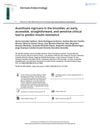 19 citations,
January 2007 in “Dermatology”
19 citations,
January 2007 in “Dermatology” Unwanted facial hair significantly impacts over 40% of women's psychological and social well-being, and various treatment options are available.
 12 citations,
September 2011 in “Archives of Dermatological Research”
12 citations,
September 2011 in “Archives of Dermatological Research” Policemen have more hair loss due to obesity, sunlight exposure, and stress.
 49 citations,
September 2012 in “The Journal of clinical endocrinology and metabolism/Journal of clinical endocrinology & metabolism”
49 citations,
September 2012 in “The Journal of clinical endocrinology and metabolism/Journal of clinical endocrinology & metabolism” The document concludes with guidance for doctors on diagnosing and treating hirsutism effectively and safely.
[object Object]  38 citations,
January 2014 in “International Journal of Endocrinology”
38 citations,
January 2014 in “International Journal of Endocrinology” Adrenal disorders can cause lasting brain and behavior issues in children.
 43 citations,
October 2019 in “Pediatric Research”
43 citations,
October 2019 in “Pediatric Research” Lifestyle changes are the main treatment for PCOS, which is a complex condition requiring early management to reduce its health impacts.

There is no cure for myotonic dystrophy type 1, so treatment focuses on managing symptoms and complications.

Drinking sweetened tea and soda and poor sleep may increase the risk of hair loss in women.
 April 2023 in “Clinical Chemistry and Laboratory Medicine”
April 2023 in “Clinical Chemistry and Laboratory Medicine” The document concludes that inflammation markers can be used in diabetes, vitamin D3 affects immune pathways, hyperthyroidism changes hormone levels, androgen levels help diagnose Adrenocortical Carcinoma, erectile dysfunction is linked to diabetes, hypogonadism is common in HIV-infected males, and hormones can be biomarkers for various conditions.
 28 citations,
October 2013 in “Journal of The American Academy of Dermatology”
28 citations,
October 2013 in “Journal of The American Academy of Dermatology” Ovarian SAHA syndrome makes women with PCOS more resistant to insulin and increases their risk of blood sugar problems.

Losing weight and eating better are key to managing metabolic syndrome and its related conditions.
 3 citations,
January 2021 in “Journal of Research in Medical Sciences”
3 citations,
January 2021 in “Journal of Research in Medical Sciences” Certain medications can impact metabolic syndrome, with some improving conditions like high blood sugar and others having no effect.
 6 citations,
January 2018 in “Dermato-endocrinology”
6 citations,
January 2018 in “Dermato-endocrinology” Darkened knuckles can be an early sign of insulin resistance.
 December 2021 in “Acta Marisiensis”
December 2021 in “Acta Marisiensis” Insulin resistance increases the risk of developing type 2 diabetes and other health issues.
 60 citations,
September 2001 in “Journal of the American Academy of Dermatology”
60 citations,
September 2001 in “Journal of the American Academy of Dermatology” Insulin resistance contributes to hormone imbalances in many women with polycystic ovary syndrome.
 114 citations,
January 2014 in “World Journal of Gastroenterology”
114 citations,
January 2014 in “World Journal of Gastroenterology” People with PCOS, especially if obese, often have NAFLD, linked to obesity, insulin resistance, and high androgen levels.
 1 citations,
May 2009 in “Wiley-Blackwell eBooks”
1 citations,
May 2009 in “Wiley-Blackwell eBooks” Early treatment of PCOS in teens is crucial to prevent long-term health issues like diabetes and heart disease.
 28 citations,
August 2009 in “Nursing for Women's Health”
28 citations,
August 2009 in “Nursing for Women's Health” Cognitive behavioral strategies help women with PCOS make lifestyle changes to improve their health.
 19 citations,
January 2013 in “Pediatrics in review”
19 citations,
January 2013 in “Pediatrics in review” The document says menstruation is important for women's health, discusses menstrual disorders, and suggests personalized treatment options.
 71 citations,
November 2009 in “Best Practice & Research in Clinical Obstetrics & Gynaecology”
71 citations,
November 2009 in “Best Practice & Research in Clinical Obstetrics & Gynaecology” PCOS in teens is hard to diagnose, linked to genetics and lifestyle, and managed with weight loss and medication.
 1 citations,
January 1996 in “Gynecological endocrinology”
1 citations,
January 1996 in “Gynecological endocrinology” Non-invasive imaging helped diagnose a woman's severe hormone imbalance and diabetes, and medication successfully treated her condition.
[object Object]  January 2024 in “International Journal of Dermatology Venereology and Leprosy Sciences”
January 2024 in “International Journal of Dermatology Venereology and Leprosy Sciences” Patients with acne vulgaris have lower serum irisin levels.
 11 citations,
July 2012 in “Current Opinion in Pediatrics”
11 citations,
July 2012 in “Current Opinion in Pediatrics” Skin problems can be signs of hormone-related disorders and recognizing them early is important for treatment.
 30 citations,
June 2019 in “Frontiers in Endocrinology”
30 citations,
June 2019 in “Frontiers in Endocrinology” The document concludes that managing non-classical congenital adrenal hyperplasia in females requires personalized treatment, genetic counseling, and a team of specialists.
 4 citations,
June 2006 in “Primary Care”
4 citations,
June 2006 in “Primary Care” The document recommends a team-based approach and personalized care for managing diabetes in teenagers.
 5 citations,
January 1998 in “Clinical and experimental dermatology”
5 citations,
January 1998 in “Clinical and experimental dermatology” Myotonic dystrophy should be considered in patients with hair thinning, and genetic counseling is important.
 67 citations,
September 2008 in “Dermatologic therapy”
67 citations,
September 2008 in “Dermatologic therapy” Hirsutism is excessive hair growth in women often caused by polycystic ovarian syndrome, and identifying the cause is important for managing associated health risks.
 December 2014 in “Endocrinología y nutrición”
December 2014 in “Endocrinología y nutrición” The woman's rare combination of diseases suggests an unknown factor may predispose individuals to multiple endocrine diseases.
 September 2014 in “Journal der Deutschen Dermatologischen Gesellschaft”
September 2014 in “Journal der Deutschen Dermatologischen Gesellschaft” Diabetes can cause a variety of skin disorders, some of which may signal more serious health issues.

Korean patients with androgenetic alopecia may have a higher risk of heart-related health issues and could benefit from early heart screening and healthier lifestyles.
 76 citations,
November 2009 in “Medical Clinics of North America”
76 citations,
November 2009 in “Medical Clinics of North America” Hormones, especially androgens, play a key role in acne, which can be a symptom of systemic diseases like PCOS and may require targeted treatment.






























